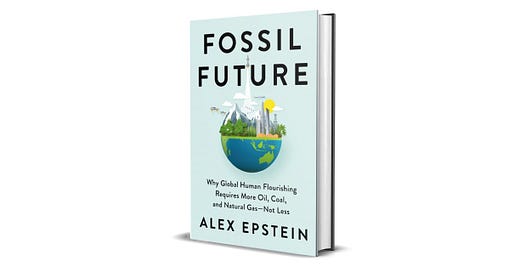Alex Epstein introduced the notion of “climate mastery” in The Moral Case for Fossil Fuels, but Fossil Future turns it into a formidable intellectual battering ram. Plenty of thinkers talk about “adaptation” to global warming. Where you hear “adaptation,” though, it’s hard to be optimistic. You can practically hear the hand-waving: Faced with global climactic changes, human beings are just supposed to “adapt”?!
Epstein’s answer, in effect is: Yes, because we already “adapt” on a massive scale. Adaptation is not a novel solution to a novel problem. It is a standard solution to a standard problem:
We are typically taught that whatever the benefits of fossil fuels or other forms of energy are, they always come at the expense of our environmental safety and health.
But the history of climate safety shows that fossil-fueled machine labor makes us far safer from climate— a phenomenon I call “climate mastery.”
(Adaptation, the term often used, does not do justice to the power of this phenomenon or its dependence on cost-effective energy.)
Climate mastery is what has allowed humanity to reduce climate-related deaths by 98% over the last century:
[O]ver the last century, as CO2 emissions have most rapidly increased, the climate disaster death rate fell by an incredible 98 percent. That means the average person is fifty times less likely to die of a climate-related cause than they were in the 1920s.
The first time I read this statistic, I didn’t think it was possible. But rechecking the data repeatedly, I found that was indeed the case: the rate of climate-related disaster deaths has fallen by 98 percent over the last century.
This means that not only does our knowledge system ignore the massive, life- or- death benefits of fossil fuels, but it has a track record of being 180 degrees wrong about the supposedly catastrophic side-effect of climate danger — which has dramatically decreased.
The facts of climate mastery are so clear that Epstein accuses alarmists of “climate mastery denial”:
Knowing that our knowledge system consistently denies temperature mastery is crucial context to keep in mind whenever we hear claims about “catastrophic” temperature changes in the future; there is a very good chance those claims are based on climate mastery denial, and that without such denial catastrophe would be implausible.
Do climate mastery denialists really exist? Sure, just start with Paul Krugman. You might think that a famed and brilliant economist would avoid childish hyperbole, but no such luck:
The mainstream knowledge system makes its unjustifiable dismissal of fossil-fueled climate mastery seem reasonable by portraying adaptation as being already overwhelmed by negative human impacts on climate.
Nobel Prize–winning economist Paul Krugman writes: “While it will take generations for the full consequences of climate change to play out, there will be many localized, temporary disasters along the way. Apocalypse will become the new normal — and that’s happening right in front of our eyes… The dangers of climate change are no longer predictions about the future.”
If “adaptation” is already being overwhelmed by rising CO2 levels, it’s plausible to assume that our mastery abilities will be unable to handle the suposedly far worse consequences to come as CO2 levels continue to rise. As Krugman puts it, “We can see the damage now, although it’s only a small taste of the horrors that lie ahead.”
But the idea that climate danger is bad and getting worse, overwhelming our mastery abilities, is completely false.
Of course, the fact that climate mastery is working out swimmingly for now doesn’t mean that it won’t be overwhelmed in the future. What it does mean, though, is that we should focus on climate dangers well beyond the current observed range. How likely are such dangers?
Epstein considers a long list of such potential dangers: extreme temperatures, droughts, storms, rising sea levels, and more. The big picture:
[I]f we look at the universally acknowledged history of climate and life on this planet, we inevitably come to the conclusion that rising CO2 levels leading to an unlivable planet is literally impossible — because the planet was incredibly livable for far less-adaptable organisms, with much in common with us, when CO2 was at levels that we could not come close to even if we wanted to.
Specifically:
The global climate system is near historic lows in CO2 and temperature.
We have no near-term mechanism of reaching even one fourth the historical high of CO2.
Life on Earth thrived at far higher CO2 levels and temperatures in the past.
Planetary warming is concentrated in colder parts of the Earth — it is not truly global.
Epstein continues:
Thus when we think of the impact of rising CO2 levels, we must recognize that it will be, to the extent CO2 causes warming, a transition from today’s masterable global climate system to a more tropical, masterable global climate system — not some scorching global desert, as is often portrayed.
This dramatically limits how bad climate impacts can be. The only legitimate concern about human climate impact going forward is not an unlivable planet but rather that the rate of change to a more tropical global climate system would be highly disruptive given our current infrastructure investments — including the location of coastal cities.
On that note:
Irresponsible reporting will deliberately choose places with local factors leading to relatively rapid local sea level rises, such as Miami, and blame them on allegedly disastrous global sea level rise.
But in reality, sea level rises have been slow as CO2 levels have risen for 170 years. Is there any reason to believe that they’ll go from one foot per century to something scary like multiple feet per decade?
Let’s look at what the IPCC, which has numerous incentives to overstate any problems, says. In a 2019 report, it was estimated that in an extreme missions scenario, sea levels will rise thirty-three inches — less than three feet — by 2100.
Even if this likely overstatement is true, it is completely masterable by an empowered world — a world where over 100 million people already live below high tide in their area — and where enormous fossil-fueled productivity can be directed toward relocation of population centers if need be.
Needless to say, I’m skipping over piles of details. Epstein however, does not. What makes his treatment of the details credible, though, is his Big Picture: Given all of the horrors of nature that humanity has already mastered, humanity can clearly master some more. Yes, we can imagine worst-case scenarios that overwhelm our abilities. Imagination, after all, is infinite. But that doesn’t show that such scenarios are likely enough to worry about.
As I’ve argued before, our default should that worst-case scenarios are highly unlikely. After all, humanity already got this far. If specialists with a long track record of hyperbole warn us of doom, we should ignore them. Unless, of course, specialists with a long track record of calm, measured thought chime in, “For once, the doomsayers are right.” Show me these specialists, and I’ll read them.
Subscribe to Bet On It
Caplan and Candor


















Maybe a good way to proactively begin mastery of higher sea levels is for the government to stop subsidizing peoples' choice to move into dangerous hurricane prone areas through federal insurance.
Somehow I think the catastrophists wouldn't like this suggestion.
Bryan, what is your theory of why someone as intelligent as a Paul Krugman makes these statements? I think that you don't like to speculate about motives but it is hard to avoid the conclusion that this is a case of "don't let a crisis go to waste" thinking, even if you have to invent the crisis. What do you think?